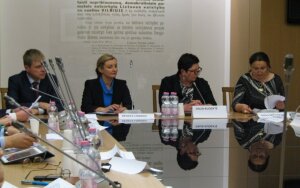- November 13, 2014
- 221
National minorities vs. “demonic” Commission of the Lithuanian Language

There was the discussion about the National Minorities Act in Seimas yesterday. The Liberal Union of Lithuania was supposed to present its own variant of the Act but the discussion was as usual, that is, nothing concrete.
In the discussion initiated by the Liberal Union of Lithuania which was represented by Dalia Kuodytė, Remigijus Šimašius and Renata Underis, the representatives of national minorities in Lithuania, the Ministry of Culture, Commission of the Lithuanian Language, Cabinet Office, the Electoral Action of Poles in Lithuania and others took part.
At the beginning, the moderator of the discussion Dalia Kuodytė said that the National Minorities Act is prepared and prepared by the Ministry of Culture but the final version cannot reach Seimas in any way.
“I am in favour of the variant of the Act prepared under the supervision of the former Minister of Culture Edward Trusewicz,” said Kuodytė.
The proposition of the Ministry of Culture was presented by the Deputy Minister Agneta Lobačevskytė who took over the position of Trusewicz.
“The Ministry of Culture currently concentrates on the Act which went through two initial stadiums in Seimas. Preparing the new project, negotiations and registration in Seimas again are not purposeful. Only in case of the rejection of this project, the Ministry of Culture will take up a new one,” said Lobačevskytė.
I asked the speakers to precise if it is the bill that was corrected ruthlessly, that is, the most important issues of national minorities were removed by the members of Parliament with Valentinasa Stundysa as a leader. Kuodytė commented that such an act is not needed in her opinion.
National minorities vs. “demonic” Commission of the Lithuanian Language
The representatives of national minorities spoke next. Their speeches were different only in expression and emotions.
The Chair of the Association of the Teachers of Russian schools in Lithuania, Ela Kanaitė criticised the Act and pointed out that there is no clear description what a national minority is. The representative of Armenian minority Ruslan Arutiunian said that the project brings us back to the 90s and it is not modern, especially in educational issues. The representative of Jewish community Daumantas Todesas was more concrete. “There is the danger that for small minorities, a new reserve will be built and the big minority will build an internal state. What if I live in a place where I am alone? I do not have these rights? There should be a special institution participating in governing the country and representing national minorities. We want to integrate but not assimilate,” said Todesas.
The head of the community of Lithuanian Greeks, Georgios Macukatov spoke in the most strict and emotional way. Firstly, he accused the Commission of the Lithuanian Language of being above the law and above the President.
“They have fed us with promises for 23 years. My country accepted Lithuania in European Union, whereas I feel discriminated in Lithuania. Officials invite us, take us to Seimas, listen to us and they forget about about us after the discussion. Later we think “again the same”,” said indignant Macukatov.
Liberal Remigijus Šimašius spoke after the representative of national minorities. He mentioned the following problems: the original spelling of surnames, establishing national minorities’ rights, the right to have contact with mother tongue and teach in native language, double nomenclature.
“We must eventually understand that minorities are our wealth, not burden,” said Šimašius.
National language above all
The Chair of the Commission of the Lithuanian Language Daiva Vaišnienė she was defending from accusations in the typical for her way. She was smiling and asked not to mythologise and demonise Commission. She kept on quoting fragments of the Framework Convention for the Protection of National Minorities and giving examples of language models, and the solutions of problems connected with bilingualism in Sweden and Estonia.
The statement about the project of Constitutional Act on Lithuanian Language was interesting and at the same time alarming. “Constitutional Act on Lithuanian Language will establish the environment of Lithuanian language and the rest will be for other languages,” said Vaišnienė. It seems that the Constitutional Act will separate (for always and without concessions) Lithuanian language from any attacks, that is, “leave us alone.”
The Deputy Speaker of Seimas, Jarosław Narkiewicz mentioned interesting arguments. “It is strange for me that the old Act on National Minorities was in accordance with Constitution when we entered NAT, when we entered EU and now suddenly it is against Constitution. I do not understand how the country who legislature was against Constitution could be admitted to military alliance and European Community,” asked Narkiewicz as a rhetorical question.
Punchline
To sum up, during the discussion, there were problems knows practically by all people, there were the same conclusions as in million other discussions and the solution of the problems is not any closer. I expected the presentation of the variant of the Act on National Minorities in liberal version but I went out disappointed. To be honest, almost everybody got the Bill analysis of whom I will present soon at least to learn what is the position of liberals in this matter.
Translated by Marta Wojtowicz within the framework of a traineeship programme of the European Foundation of Human Rights, www.efhr.eu.

